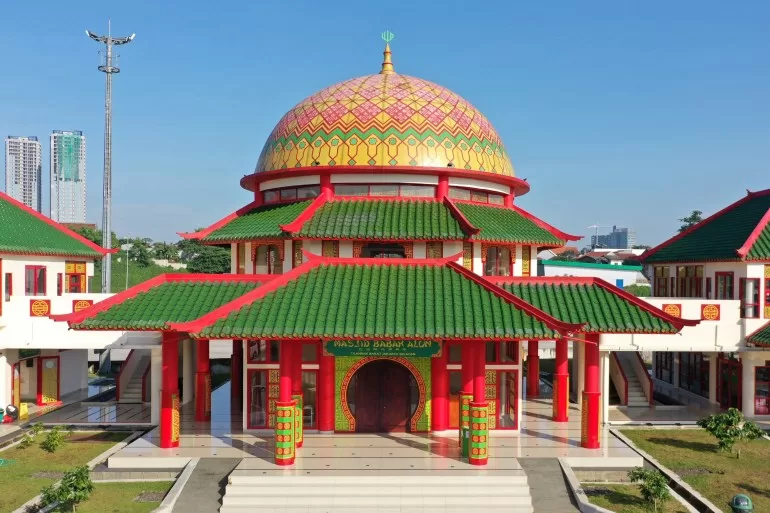About 87 percent of Indonesia’s more than 270 million people are Muslim and while most of the nearly 3 million ethnic Chinese – according to its 2010 census – are Buddhist or Christian, others have become Muslim.
Muslims around the world are expected to mark Eid on April 10 this year.
Johanes Herlijanto, the co-founder and chairman of the Indonesian Sinology Forum (FSI), said estimating the number of Chinese Indonesian Muslims was “very difficult” as “the number of ethnic Chinese people as a whole was still a matter of debate”, referring to the differing figures between experts.
Johanes said they were “a diverse community” with varying commitments to their religion.
“We will find people who practise religion strictly, for example, wearing Islamic clothing. There are even religious leaders among them,” he said.
“We will also find people who do not really emphasise their religious identity, so they are not too different from ethnic Chinese society in general.”
Agni Malagina, an independent researcher focusing on the Chinese Indonesian community, said people suspected Chinese who became Muslim often let go of their cultural identity, but she said that was not necessarily true.
“Many still know their roots and do not hesitate to admit their Chinese identity,” she told Al Jazeera.
Agni, who previously taught sinology at Universitas Indonesia, said the community’s acculturation process was “dynamic” and that interethnic marriage was “the most common” way Chinese became Muslim, although Indonesia’s marriage law does not explicitly require non-Muslims to convert to get married.
She cited lontong opor ayam (braised chicken in coconut milk served with rice cake) as an example of Chinese and Indonesian Muslim cultural fusion. The food is served during Lebaran.
“[Chinese Muslim families] respect each other by serving halal dishes,” she added.
But Johanes of FSI said he also heard how some Chinese families discriminated against those who “decided to convert to Islam”.
“Whatever the initial motivation for embracing Islam, their unique identity and their efforts to build a space for intercultural interaction… could be considered successful,” he told Al Jazeera.
Al Jazeera spoke to three Chinese Indonesians who are Muslim about their cultural identity.
Maria Leoni, 36
Maria Leoni lives in a village in Jepara, Indonesia’s Central Java province, and runs an ikat cloth business – under the KAINRATU brand – with her husband.
Once a Christian, Leoni converted to Islam when she was 17 after becoming fascinated by the mosques and hearing the Islamic adhan or call to prayer.
“I was happy hearing the adhan at sunset. I was in front of the television [waiting for adhan]. Perhaps it was already meant to be this way [for me to be Muslim],” she said, wondering “why it sounded pleasant”.
The mother of three, whose parents died when she was in primary school, lived with her late mother’s family. However, when she began wearing the hijab, they told her to leave and she went to live in an orphanage.
Leoni has since deepened her understanding of Islam and went to Saudi Arabia for the umrah in 2019. She is also a member of the Indonesian Chinese Muslim Association.
The 36-year-old has celebrated Ramadan with her family for many years and sees food as a way to bring people together. She enjoys cooking the Chinese Indonesian stir-fried vegetable dish capcai, while her husband likes Javanese-style fried chicken marinated with various spices.
Leoni and her family will visit her husband’s relatives and neighbours’ homes during Lebaran.
“I am proud, even though I am a minority. Proud to be a Muslim, to be a Chinese,” she told Al Jazeera.
Sandra Insana Sari, 28
Sandra Insana Sari works as a freelance master of ceremony and moderator.
She lives in Tangerang, near Jakarta.
Sandra’s ethnic Chinese father converted to Islam from Confucianism after getting to know her mother, who is Sundanese, one of Indonesia’s largest ethnic groups.
From kindergarten to primary school, Sandra remembers being racially taunted as Chinese by fellow children – so much so she told people she was Sundanese when they asked.
As she got older, however, the former producer for national television found her mixed background was useful.
“Building relationships would be easier if we were based on similarities,” she said.
“Communication would be closer if we had something in common.”
The 28-year-old says her non-Muslim ethnic Chinese extended family would often break fast with her during Ramadan and invite her to their homes to celebrate Lebaran.
Her hosts would serve nastar (bite-sized pineapple tarts that are popular during festive seasons in Indonesia) and other snacks. When visiting their homes, they also prepared her halal dishes.
“I am accepted as Chinese, I am accepted as Muslim,” she told Al Jazeera. “Accepted in both [worlds].”
Olivia ‘Oliv’ Javina, 20
Originally from Surabaya, Indonesia’s second-largest city, Olivia ‘Oliv’ Javina moved to Lasem in Central Java in 2015.
The 20-year-old works in digital marketing for her family’s business in Lasem-style hand-drawn batik cloth, which was started by her late grandfather Sigit Witjaksono.
Sigit, a prominent Chinese Indonesian, converted to Islam from Confucianism in 2018; he died three years later.
Lasem is known as the “Town of Santri”, meaning students of pesantren or Islamic boarding schools.
Oliv was one of them.
Before breaking her fast, Oliv tunes into YouTube to listen to fiqh (Islamic jurisprudence) and other Islamic texts.
She then shares takjil – light snacks with which Muslims break their fast at sunset – such as lemper (savoury glutinous rice with meat filling) with her non-Muslim relatives.
Lasem is also called “Little China” – in part because it is believed to be one of the places where Chinese migrants first arrived in Java.
For Lebaran, Oliv and her extended family – some of them Catholics and some Confucians – will gather together in Lasem.
“What I am most proud of [in Lasem] is [its] tolerance,” she told Al Jazeera.
